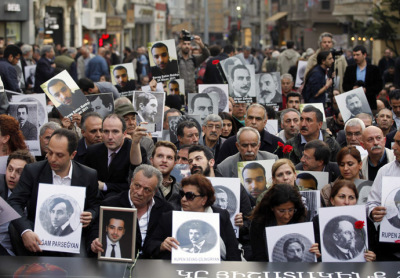It's Time to Learn About Genocide: 20 Things You Can Do

April is genocide awareness month.It is the month where we mark the anniversary of the Siege of Sarajevo, the Rwanda Genocide, the Cambodia Genocide, and the Armenian Genocide. It is also an important time as we are witnessing the genocide against Assyrian and other Religious minorities at the hands of ISIS executioners. The Philos Project is pleased to partner with the 21st Century Wilberforce Initiative to offer 20 Things you can do during Genocide Awareness Month. Please visit our partner site and check Facebook to share memes. Genocide ends when the righteous power of multiple nations comes together to end it. We must speak for those who are silenced because of their suffering. Speak up today.
1. Understand the issue. Read the "What is Genocide?" page at genocidewatch.net and link to this page through social media.
2. Join the Enough Project's e-mail list so you stay informed on issues related to genocide.
3. Learn more from the United Nations about the Responsibility to Protect (R2P), a relatively new doctrine that informs much of genocide prevention today.
4. Encourage your local bookstore or library to display books related to genocide during the month of April.
5. Learn more about the Bosnian Genocide. April 5 marks the anniversary of the siege of Sarajevo. World Without Genocide has excellent background information about the genocide in Bosnia.
6. Learn more about the Rwandan Genocide. April 6 marks the anniversary of the start of this event. The BBC offers an excellent overview of the events of this genocide.
7. Practice being an up stander: give to an organization that provides aid for those who are oppressed because of race, ethnicity or religion. Then post about it on social media. Some suggestions: Samaritan's Purse, World Help, the Global Jewish Service Corp, or American Jewish World Service.
8. Visit United to End Genocide's Web site and complete one of the "Take Action" items posted there.
9. Gregory Stanton has developed a framework for examining genocide, the "10 Stages of Genocide." Visit Genocide Watch's Web site to learn more about this framework and the recommended preventative steps you can take to stop genocide early.
10. Host a screening of a genocide-related film in your house with a discussion afterwards. Some suggestions: Schindler's List (the Holocaust), Hotel Rwanda, The Devil Came on Horseback (Sudan), Kinyarwanda (Rwanda) or documentaries such as Ghost of Rwanda, A Generation After Genocide, Burden of My Heart, Back to Ararat (Armenian), My Son Shall Be Armenian, and Screamers, Deacon of Death (Cambodia), the Land of the Wandering Souls (Cambodia), 40 Years of Silence: An Indonesian Tragedy, Between Hitler and Stalin, Darfur Now (Sudan).
11. Nicholas Kristof, a columnist for The New York Times, works tirelessly on genocide awareness. Read his columns related to genocide.
12. Learn more about the Cambodian Genocide. April 17 is considered the anniversary. Yale University's Cambodian Genocide Project has many resources for a study of this event.
13. Read a book about genocide, such as Genocide: A Comprehensive Introduction by Adam Jones, or read about past U.S. response to genocide in Samantha Power's book A Problem From Hell: America in the Age of Genocide.
14. Learn more about the Armenian Genocide. April 24 is considered the anniversary.
15. Women for Women International helps survivors of genocide – a crime often conducted during war – rebuild their lives. Visit this site to learn more about the organization and how you can help.
16. Genocide is ultimately about the loss of humanity and recognition of human rights. Read the Universal Declaration of Human Rights, adopted in 1948 by the United Nations. Select one right you wish to promote in your community and write a letter to local groups or volunteer for an organization that supports that right.
17. Learn more about events occurring in the Democratic Republic of the Congo by visiting the USHMM's Committee on Conscience web site.
18. Check with your local school to discover what genocide resources are needed in its library and provide funding for one or two books.
19. Download a Church Alert on the Situation of Religious Minorities in Iraq. Share this resource about a genocide continuing to unfold today.
20. Pray for those who are victims of genocide today, for an end to governments and systems that allow genocide to continue, and for the courage and tenacity to be an active advocate for justice.




























